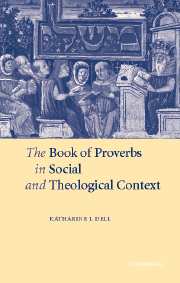Book contents
- Frontmatter
- Contents
- Preface
- List of Abbreviations
- Introduction
- 1 Social context(s) in Proverbs 1–9
- 2 Social context(s) in Proverbs 10:1—22:16
- 3 Social context(s) in Proverbs 22:17—31:31
- 4 Mention of Yahweh in Proverbs
- 5 Theological context
- 6 Echoes of other Old Testament texts and contexts in Proverbs
- Conclusion
- Bibliography
- Index
Introduction
Published online by Cambridge University Press: 22 September 2009
- Frontmatter
- Contents
- Preface
- List of Abbreviations
- Introduction
- 1 Social context(s) in Proverbs 1–9
- 2 Social context(s) in Proverbs 10:1—22:16
- 3 Social context(s) in Proverbs 22:17—31:31
- 4 Mention of Yahweh in Proverbs
- 5 Theological context
- 6 Echoes of other Old Testament texts and contexts in Proverbs
- Conclusion
- Bibliography
- Index
Summary
Some parts of the Old Testament are far less clearly expressive of Israel's distinctive understanding of reality than others, some parts (and one thinks of such a book as Proverbs) seem to be only peripherally related to it, while others (for example Ecclesiastes) even question its essential features.
(Bright, 1967: 136)Wisdom, both as a phenomenon and as a distinct literature, has often been treated by scholars as separate from the rest of the Old Testament. Its context has been seen to have more in common with its ancient Near Eastern neighbours than with its mainstream Israelite institutions, and its theology has been seen to offer little contribution to the overall picture of Old Testament theology that is positive. This marginalization of the place of wisdom by scholars is, however, slowly changing in the light of recent interest in wisdom and attempts to understand its place in Israelite thought. The last forty years have seen a great revival of interest in the wisdom literature in its own right. Recent decades have also seen an interest in wisdom as a unifying feature of texts as employed by later redactors. However, despite such attempts to define and understand wisdom, there is much work that still needs to be done in the area of its integration with the rest of the Old Testament.
- Type
- Chapter
- Information
- Publisher: Cambridge University PressPrint publication year: 2006
- 2
- Cited by



